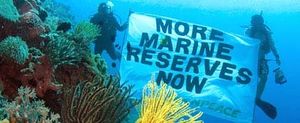
From July 2004 to July 2006, there was a study conducted by the Fisheries Service and Direction of the Environment of French Polynesia to monitor Marine Protected Areas (MPAs). The design of the study was to compare the before and after status of the MPAs and whether or not the environmental protection methods in place were at all effective. The overall study showed positive improvement. Despite the lack of regulation, there has been extensive studies on marine populations, specifically in Moorea, French Polynesia. This provides reliable data to compare to recent results.
Results showed that while the population of commercial fish declined, the biodiversity, biomass, and trophic structure of the commercial fish has greatly altered. This is because of the extreme overharvesting of fish that led to a ten year plan to rebalance fish populations with immense local collaborative efforts. Due to the amount of history and knowledge, the study was able to implement it toward a better protection program for the MPAs. The fisheries department expects MPAs to thrive in the near future.
Tourism[edit | edit source]
However, tourism has been impacted the environment in French Polynesia. Because of the tropical location tourism relies heavily on boating. Boat anchors have little control when making contact on the seabed habitat and repeated anchoring has caused damage to the reef and to species. It is unlikely for the environment to see drastic positive change when the country is dependent on tourism economically.
Government Efforts[edit | edit source]
The government of French Polynesia announced its intentions to make marine and island sites potential protected nature reserves in October 2013. The Minister of Marine Resources for French Polynesia, Tearii Alpha, made the announcement after a weeklong International Marine Protected Areas Congress in Marseille, France.
There has been a lack of regulation for the environment in French Polynesia, relatively speaking. In 2012, 20 marine species were discovered that had not been scientifically identified yet. Several whale species native to French Polynesia are considered endangered, including the fin whale and the blue whale. There are also species of whale and dolphin such as the pygmy killer whale, fraser's dolphin and spinner dolphin, that do not have enough data available to be considered endangered.
The environmental group GreenPeace has proposed the Moana Marine Reserve to be a no-take reserve. The area is bordered by economic fishing zones and it is an essential breeding ground for the minke whales. However, the over-fishing is negatively impacting the whale population. Local governments are working with environmental organizations and non-profits to find common ground with the local economy.
Sources[edit | edit source]
http://www.pewenvironment.org/news-room/other-resources/french-polynesia-to-begin-process-to-protect-marquesas-island-waters-85899515405 http://scholarspace.manoa.hawaii.edu/handle/10125/22719 http://www.greenpeace.org/international/en/publications/reports/pacific-enclaves/